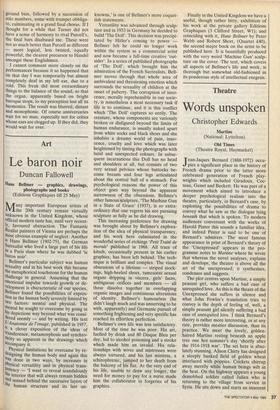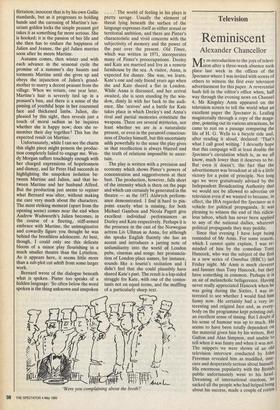Theatre
Words unspoken
Christopher Edwards
Martine (National: Lyttelton) Old Times (Theatre Royal, Haymarket)
Jean-Jaques Bernard (1888-1972) occu- pies a significant place in the history of French drama prior to the latter more celebrated generation of French play- wrights which included Giradoux, Coc- teau, Genet and Beckett. He was part of a movement which aimed to introduce a deeper psychological realism into the theatre, particularly, in Bernard's case, by exploiting the possibilities of drama to convey what he saw as the dialogue lying beneath that which is spoken. To modern audiences conversant with the works of Harold Pinter this sounds a familiar idea, and indeed Pinter is said to be one of Bernard's admirers. The most famous appearance in print of Bernard's theory of the 'Unexpressed' appears in the pro- gramme notes to Martine where he wrote that whereas the novel analyses, explains and develops, the theatre is above all the art of the unexpressed; it synthesises, condenses and suggests.
The plot centres upon Martine, a simple peasant girl, who suffers a bad case of unrequited love. As this is the theare of the Unexpressed she suffers in silence and what John Fowles's translation tries to convey is the depth of feeling of, well, a simple peasant girl silently suffering a bad case of unrequited love. I think Bernard's theory is rather more interesting, or at any rate, provides meatier discussion, than its practice. We meet the lovely, golden- haired Martine resting beneath an apple tree one hot summer's day 'shortly after the 1914-1918 war'. The set here is abso- lutely stunning. Alison Chitty has designed a steeply banked field of golden wheat interlaced with poppies. Crickets chirrup away merrily while human beings wilt in the heat. On the highway appears a young demobbed soldier called Julien who is returning to the village from service in Syria. He sits down and starts an innocent flirtation; innocent that is by his own Gallic standards, but as it progresses to holding hands and the caressing of Martine's lux- uriant golden locks the simple peasant girl takes it as something far more serious. She is hooked; it is the passion of her life and she then has to endure the happiness of Julien and Jeanne, the girl Julien marries soon after he meets Martine.
Autumn comes, then winter and with each advance in the seasonal cycle the promise of a summer's day haunts and torments Martine until she gives up and obeys the injunction of Julien's grand- mother to marry a decent peasant from the village. When we return, one year later, Martine's hair is severely tied up in a peasant's bun, and there is a sense of the passing of youthful hope in her coarsened face and thickened limbs. Julien, dis- pleased by this sight, then reveals just a touch of moral sadism as he inquires whether she is happy now; does she re- member their day together? This has the expected result on Martine.
Unfortunately, while I can see the charm this slight piece might possess the produc- tion completely failed to engage me. Wen- dy Morgan suffers touchingly enough with her charged expressions of hopelessness and dismay, and Sir Peter Hall succeeds in highlighting the unspoken isolation be- tween Martine and Julien, and that be- tween Martine and her husband Alfred. But the production just seems to register what Bernard was after, without making me care very much about the characters. The most striking moment (apart from the opening scene) comes near the end when Andrew Wadsworth's Julien becomes, in the course of a fleeting, stiff-armed embrace with Martine, the unimaginative and cowardly figure you thought he was behind the breathless adolescent. At best, though, I could only see this delicate bloom of a minor play flourishing in a much smaller theatre than the Lyttelton. As it appears here, it seems little more than a sub-plot cut adrift from some larger work.
Bernard wrote of the dialogue beneath what is spoken. Pinter too speaks of a hidden language: 'So often below the word spoken is the thing unknown and unspoken
. . . .' The world of feeling in his plays is pretty savage. Usually the element of threat lying beneath the surface of the language expresses itself as either sexual or territorial ambition, and there are Pinter's characteristic and vivid concerns with the subjectivity of memory and the power of the past over the present. Old Times, which was written in 1971, incorporates many of Pinter's preoccupations. Deeley and Kate are married and live in a remote farmhouse by the sea. A visitor, Anna, is expected for dinner. She was, we learn, Kate's one and only friend years ago when she and Kate shared a flat in London. While Anna is discussed, and her arrival awaited, she is seen standing by the win- dow, dimly lit with her back to the audi- ence. She 'arrives' and a battle for Kate takes place in which Deeley's and Anna's rival and partial memories constitute the weapons. There are several mysteries, not least whether we are in a naturalistic present, or even in the paranoid conscious- ness of Deeley himself, but this uncertainty adds powerfully to the sense the play gives us that recollection is always blurred and the truth of relations impossible to ascer- tain.
The play is written with a precision and economy which shows Pinter's powers of concentration and suggestiveness at their best. The production, however, falls short of the intensity which is there on the page and which can certainly be generated in the theatre — as the 1971 Aldwych perform- ance demonstrated. I find it hard to pin- point exactly what is missing, for both Michael Gambon and Nicola Pagett give excellent individual performances as Deeley and Kate respectively. Perhaps it is the presence in the cast of the Norwegian actress Liv Ullman as Anna, for although she speaks English fluently she has an accent and introduces a jarring note of unfamiliarity into the world of London pubs, cinemas and songs: her pronuncia- tion of London place names, for instance, sounds like a tourist's recitation and I didn't feel that she could plausibly have shared Kate's past. The result is a lop-sided struggle for Kate, with one of the contes- tants not on equal terms, and the muffling of a particularly sharp text.
'Were you complaining about the broth?'



















































 Previous page
Previous page